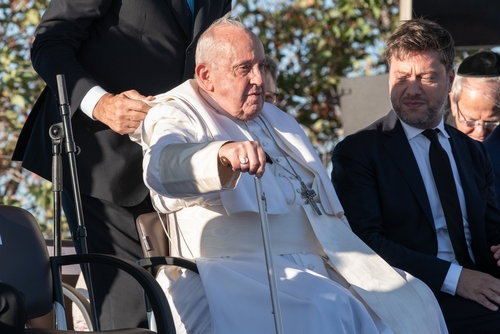
In a move that has captured the attention of Catholics around the world, Pope Francis has made a significant decision regarding his final resting place. The Pontiff, who recently celebrated his 87th birthday, has expressed his desire to be buried not within the walls of the Vatican but in the Basilica of St. Mary Major in Rome. This choice marks a departure from the long-standing tradition of popes being interred in the grottoes of the Vatican or in side chapels inside St. Peter’s Basilica.
After recovering from a serious bout of pneumonia, Pope Francis has shown resilience and a commitment to his duties. Despite health challenges, including two episodes of bronchitis this year and a hospitalization in June for an abdominal hernia and intestinal scar tissue removal, the Holy Father has remained steadfast in his role. His recent health scares have led to speculation about the possibility of resignation, a topic he has addressed with openness, acknowledging the potential while leaving the timing to divine providence.
"Can we be morally certain" that #PopeFrancis "is a false prophet? My answer is: Yes. … What we cannot do, because we do not have the authority, is to officially declare that Jorge Mario Bergoglio is not Pope." — Abp. @CarloMVigano
Agreed.
Source: https://t.co/rPeW7Umxcr pic.twitter.com/HZtdZL3ASW
— Matt Gaspers (@MattGaspers) December 12, 2023
The Pope’s connection to the Basilica of St. Mary Major is deeply personal. He holds a particular devotion to the icon of the Virgin Mary housed there, known as the Salus populi Romani (Salvation of the people of Rome). This Byzantine-style painting depicts Our Lady in a blue robe, cradling the infant Jesus. Pope Francis visits this icon to pray after each of his international trips, underscoring the significance of his choice for his burial site.
Pope Francis’ tenure has been marked by a focus on humility and service, often emphasizing his role as the bishop of Rome. His decision to be buried outside the Vatican aligns with this perspective, reinforcing his pastoral approach and closeness to the people. It also reflects his broader vision for the Church, one that embraces change and adaptation while honoring tradition.
Pope Francis Considers Resigning, Decides To Be Buried Outside the Vatican, in the Basilica of St. Mary Major
— cagrown5 (@cagrown5) December 16, 2023
The Pope’s planned visit to Belgium next year, to celebrate the 600th anniversary of the country’s two main Catholic universities, illustrates his ongoing commitment to his papal responsibilities. However, his travel plans now come with careful consideration due to his health, with distant journeys being rethought and potential limitations acknowledged.
Interestingly, Pope Francis’ decision to be buried in the Basilica of St. Mary Major brings him into proximity with Pope Pius V, who is also entombed there. Pope Pius V was the pontiff responsible for standardizing the celebration of the Mass with the Tridentine Mass, which remained largely unchanged until the post-Vatican II reforms. This juxtaposition of past and present serves as a testament to the enduring and evolving nature of the Catholic Church.
The Pope’s contemplation of resignation and his funeral preparations have sparked discussions among the faithful. While the role of pope is traditionally held for life, Pope Francis has reiterated the possibility of stepping down, much like his predecessor Pope Benedict XVI did in 2013. Should he choose to retire, Francis has indicated a desire to live in a residence for retired priests in Rome, further highlighting his preference for a simple and modest lifestyle.
As the leader of over a billion Catholics worldwide, Pope Francis’ decisions carry immense weight and symbolism. His choice of a final resting place outside the Vatican is a poignant reminder of his pastoral heart and his dedication to living out his faith in a manner that resonates with the everyday believer. It is a decision that will be remembered as part of his legacy, reflecting a pope who sought to bridge the gap between the grandeur of the papacy and the humility of service.
In conclusion, Pope Francis’ preparations for his eventual passing are not just about personal preferences; they signify a broader message about the nature of leadership and the importance of staying connected to one’s roots and community. As the world watches and reflects on his papacy, it is clear that his influence will continue to shape the Church for years to come, both in life and in death.











